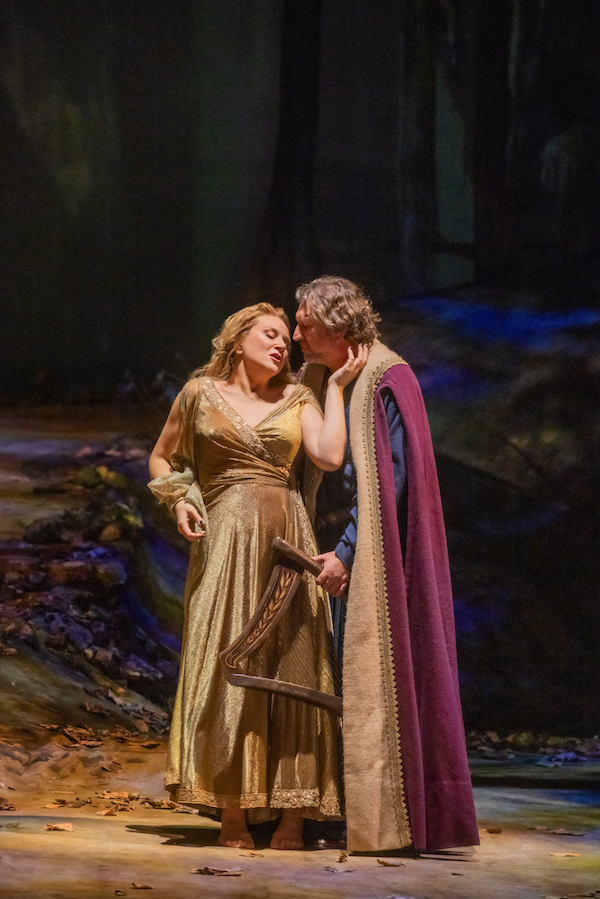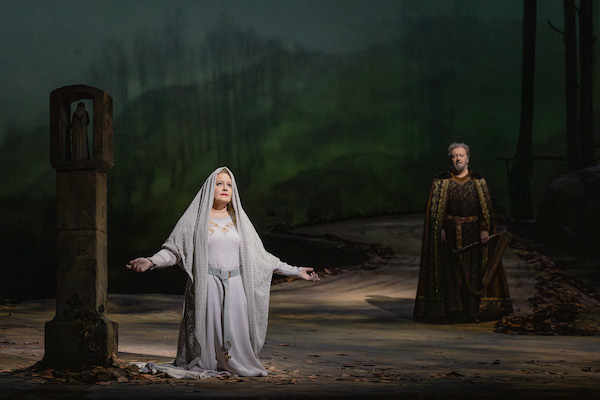Noisy protesters can’t ruin the richness and majesty of Met’s “Tannhäuser”

Climate protesters struck the Metropolitan Opera during this season’s first performance of Wagner’s Tannhäuser on Thursday evening. Midway through Act II as Christian Gerhaher was singing Wolfram’s ode to idealized love, the mayhem started. Two banners were unfurled from the balcony, one proclaiming “No opera on a dead planet” and the other “Extinction Rebellion.” The chaos continued for a while, but with the protestors presumably out of the theater, Peter Gelb, the Met’s General Manager, appeared before the curtain to say a few words and the performance continued.
Gerhaher had barely begun to resume his aria when more shouts rang forth from the rear of orchestra. Once again, the curtain came down. When calm was restored—a few audience members were pitching programs at the culprits—Gelb again appeared to announce that the Met was not going to be defeated by such antics. Further adding that house lights would be kept raised during the rest of the performance so that protestors could be quickly identified, escorted out of the theater, and arrested.
Apart from the appearance of two members of the Met staff and three security guards scanning the audience during the Prelude to Act III, there were no further disruptions. With adrenalin raised high for the musicians and audience alike by the commotion, the rest of the performance was electrifying. Pulses had been racing from the start, however, with conductor Donald Runnicles and the Met orchestra’s superb reading of the opera’s grand Overture.
For this run, the Met is reviving Otto Schenk’s hyper-realistic production first seen in 1977. Günther Schneider-Siemssen’s sets and Patricia Zipprodt’s costumes evoke the pageantry of Medieval Germany in all its romance and magnificence. Gil Wechsler’s lighting not only adds atmosphere, but also three dimensionality, especially in the Venusberg Scene. All is tended to with the greatest of care by the revival stage director, Stephen Pickover.
The ballet which opens the opera contains some of the most sensuous music that Wagner ever composed. Norbert Vesak’s choreography infuses the Bacchanal with a particularly potent eroticism as scantily clad couples cavort alongside others languidly lolling about in post-coital bliss. In the battle between sacred and profane love which lies at the heart of the opera, in Schenk’s take, the latter definitely has its allure.
Physically, Ekaterina Gubanova, embodied Venus, the enticing goddess of love with whom Tannhäuser had been enjoying forbidden delights. Her voice, however, lacked voluptuousness, especially in the upper reaches of her range. That alone made it hard to imagine an errant troubadour, especially one as dashing and fearless as Andreas Schager, to be totally enraptured by Gubanova’s Venus.
This is only the second appearance by the Austrian heldentenor at the Met, with the first being Siegfried in Wagner’s Ring Cycle of 2019. As Tannhäuser, Schager cuts a dashing, virile figure on stage and sings with astonishing ease. In “Dir Göttin der Liebe, soll mein Lied ertönen,” Tannhäuser’s exultant paean of love to Venus, Schager sang with vigor, along with richness and warmth of tone. Still vocally fresh in the final scene, the tenor gave a vivid, at times horrifying, account of his pilgrimage to Rome and his futile attempt to obtain absolution for indulgences in the pleasures of the flesh.

Elza van den Heever was a radiant Elizabeth. The soprano’s voice was thrilling in “Dich, teure Halle,” as she sang of Elizabeth’s joy upon Tannhäuser’s return. Van den Heever, however, embodied sadness and grief when she realized that Tannhäuser was not among the pilgrims returning from Rome. The soprano’s movements were mesmerizing as Elizabeth ascended a hill in her farewell to life, as she prayed to the Virgin Mary to receive her soul into heaven.
Gerhaher, the renowned German Lieder singer, was making his Met debut as Wolfram in this performance, a role that he has sung to great acclaim at the Royal Opera Covent Garden. The baritone brought his accustomed sensitivity to text and acute dramatic instincts to the role, along with robust sound when required. Even when singing at his softest, his voice carried effortlessly through the hall, as in his tender, intimate “Song to the Evening Star,” taken at a particularly leisurely tempo.
Bass Georg Zeppenfeld gave a stern, vocally resonant performance as Landgraf Hermann, Elizabeth’s father. Maureen McKay sang sweetly as the young shepherd giving praise to the pagan goddess Holda.
Runnicles led a masterly reading of Wagner’s rich score. He was ever attentive to balance, without stinting on the majesty of the opera. His ability to draw sounds of astonishing lightness and transparency enabled van den Heever and Gerhaher to produce mere whispers of tone, whose vibrations were heard and felt throughout the hall. The sounds that emerged from the pit in the Bacchanal were as enticing as the movements of the dancers on the stage.
The orchestra played magnificently at any volume. Schneider-Siemssen’s recreation of the Minnesingers’ Hall in the Wartburg Castle contains four porticos from which eight herald trumpets played. It affords a seamless sonic experience seldom encountered in any opera house. The men of the Met chorus were wonderful in the Pilgrim’s Chorus, as to be expected.
Tannhäuser continues through December 23. metopera.org